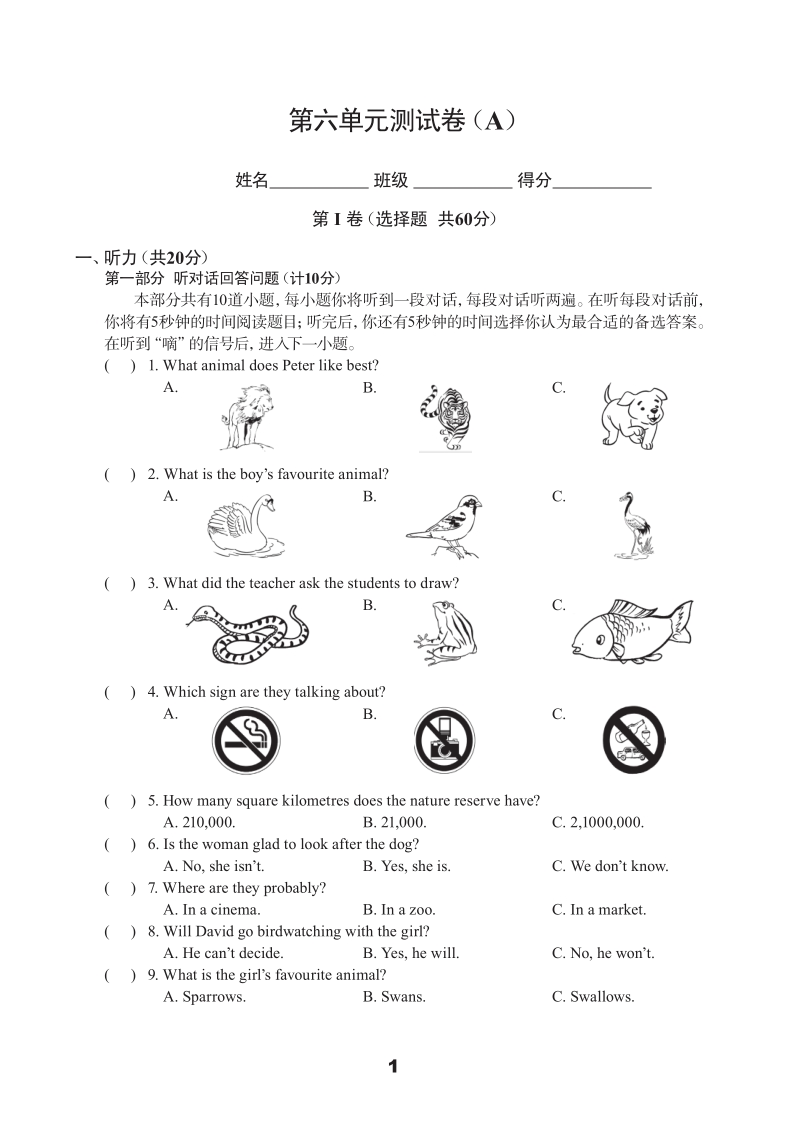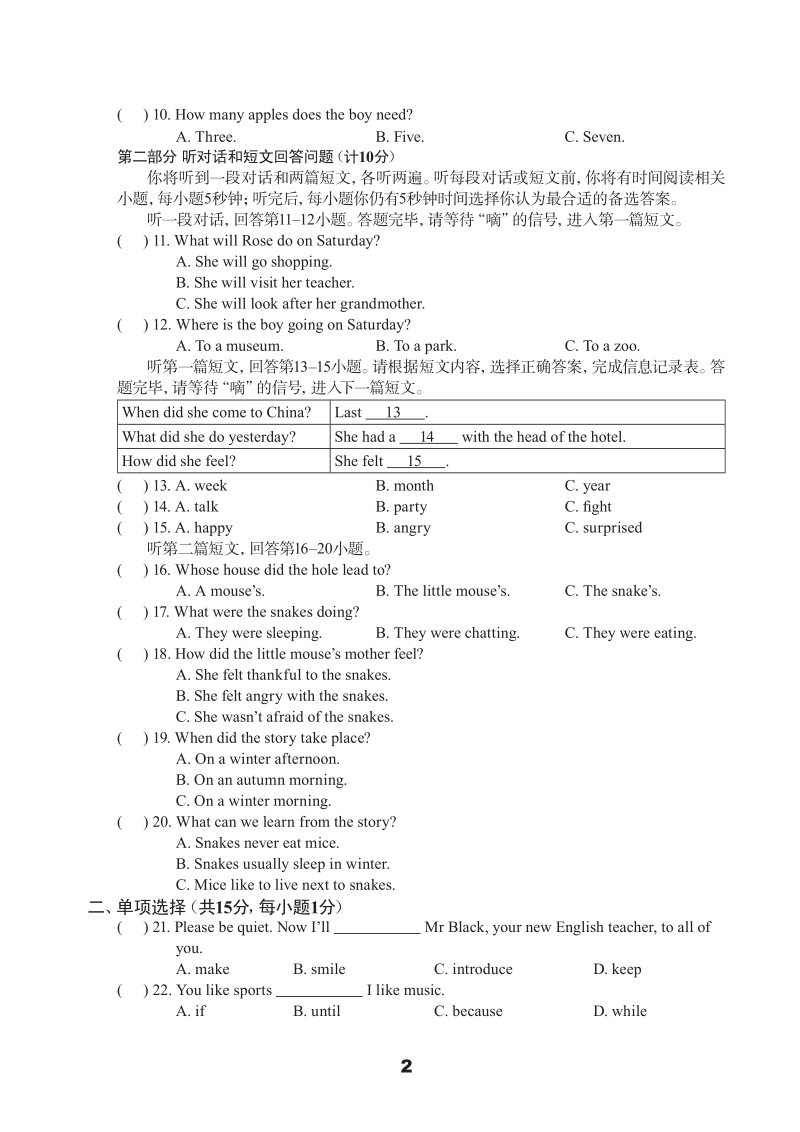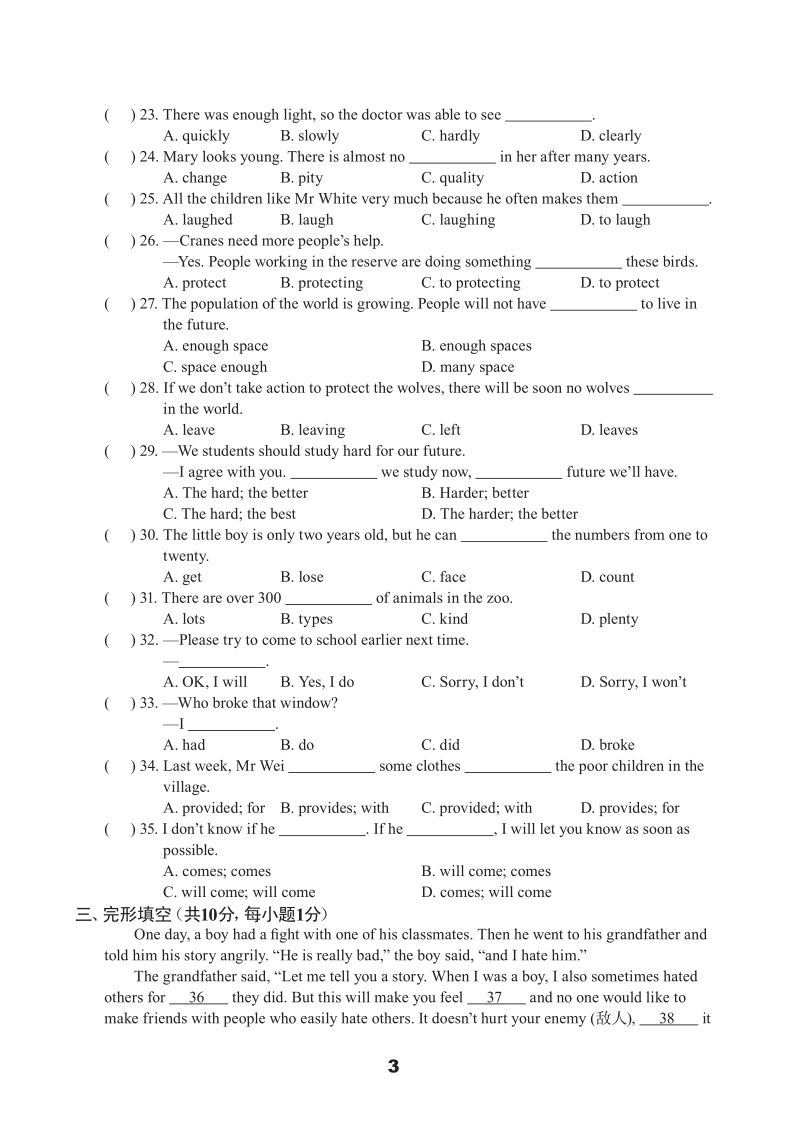 牛津译林版八年级上英语Unit6单元测试卷(A)含答案(pdf版)
牛津译林版八年级上英语Unit6单元测试卷(A)含答案(pdf版)
《牛津译林版八年级上英语Unit6单元测试卷(A)含答案(pdf版)》由会员分享,可在线阅读,更多相关《牛津译林版八年级上英语Unit6单元测试卷(A)含答案(pdf版)(10页珍藏版)》请在七七文库上搜索。
1、1第六单元测试卷(A)姓名班级得分第 I 卷(选择题 共60分)一、听力(共20分)第一部分 听对话回答问题(计10分) 本部分共有10道小题,每小题你将听到一段对话,每段对话听两遍。在听每段对话前,你将有5秒钟的时间阅读题目;听完后,你还有5秒钟的时间选择你认为最合适的备选答案。在听到“嘀”的信号后,进入下一小题。( ) 1. What animal does Peter like best?A. B. C. ( ) 2. What is the boys favourite animal?A. B. C. ( ) 3. What did the teacher ask the studen
2、ts to draw?A. B. C. ( ) 4. Which sign are they talking about?A. B. C. ( ) 5. How many square kilometres does the nature reserve have?A. 210,000. B. 21,000. C. 2,1000,000.( ) 6. Is the woman glad to look after the dog?A. No, she isnt. B. Yes, she is. C. We dont know.( ) 7. Where are they probably?A.
3、In a cinema. B. In a zoo. C. In a market.( ) 8. Will David go birdwatching with the girl?A. He cant decide. B. Yes, he will. C. No, he wont.( ) 9. What is the girls favourite animal?A. Sparrows. B. Swans. C. Swallows.2( ) 10. How many apples does the boy need?A. Three. B. Five. C. Seven.第二部分 听对话和短文回
4、答问题(计10分)你将听到一段对话和两篇短文,各听两遍。听每段对话或短文前,你将有时间阅读相关小题,每小题5秒钟;听完后,每小题你仍有5秒钟时间选择你认为最合适的备选答案。听一段对话,回答第1112小题。答题完毕,请等待“嘀”的信号,进入第一篇短文。( ) 11. What will Rose do on Saturday?A. She will go shopping.B. She will visit her teacher.C. She will look after her grandmother.( ) 12. Where is the boy going on Saturday?A
5、. To a museum. B. To a park. C. To a zoo.听第一篇短文,回答第1315小题。请根据短文内容,选择正确答案,完成信息记录表。答题完毕,请等待“嘀”的信号,进入下一篇短文。When did she come to China? Last 13 . What did she do yesterday? She had a 14 with the head of the hotel. How did she feel? She felt 15 . ( ) 13. A. week B. month C. year( ) 14. A. talk B. party C
6、. fight( ) 15. A. happy B. angry C. surprised听第二篇短文,回答第1620小题。( ) 16. Whose house did the hole lead to?A. A mouses. B. The little mouses. C. The snakes.( ) 17. What were the snakes doing?A. They were sleeping. B. They were chatting. C. They were eating.( ) 18. How did the little mouses mother feel?A
7、. She felt thankful to the snakes.B. She felt angry with the snakes.C. She wasnt afraid of the snakes.( ) 19. When did the story take place?A. On a winter afternoon.B. On an autumn morning.C. On a winter morning.( ) 20. What can we learn from the story?A. Snakes never eat mice.B. Snakes usually slee
8、p in winter.C. Mice like to live next to snakes.二、单项选择(共15分,每小题1分)( ) 21. Please be quiet. Now Ill Mr Black, your new English teacher, to all of you. A. make B. smile C. introduce D. keep( ) 22. You like sports I like music. A. if B. until C. because D. while3( ) 23. There was enough light, so the d
9、octor was able to see . A. quickly B. slowly C. hardly D. clearly( ) 24. Mary looks young. There is almost no in her after many years. A. change B. pity C. quality D. action( ) 25. All the children like Mr White very much because he often makes them . A. laughed B. laugh C. laughing D. to laugh( ) 2
10、6. Cranes need more peoples help. Yes. People working in the reserve are doing something these birds. A. protect B. protecting C. to protecting D. to protect( ) 27. The population of the world is growing. People will not have to live in the future. A. enough space B. enough spacesC. space enough D.
11、many space( ) 28. If we dont take action to protect the wolves, there will be soon no wolves in the world. A. leave B. leaving C. left D. leaves( ) 29. We students should study hard for our future. I agree with you. we study now, future well have. A. The hard; the better B. Harder; betterC. The hard
12、; the best D. The harder; the better( ) 30. The little boy is only two years old, but he can the numbers from one totwenty. A. get B. lose C. face D. count( ) 31. There are over 300 of animals in the zoo. A. lots B. types C. kind D. plenty( ) 32. Please try to come to school earlier next time. . A.
13、OK, I will B. Yes, I do C. Sorry, I dont D. Sorry, I wont( ) 33. Who broke that window? I . A. had B. do C. did D. broke( ) 34. Last week, Mr Wei some clothes the poor children in the village. A. provided; for B. provides; with C. provided; with D. provides; for( ) 35. I dont know if he . If he , I
14、will let you know as soon as possible. A. comes; comes B. will come; comesC. will come; will come D. comes; will come三、完形填空(共10分,每小题1分)One day, a boy had a fight with one of his classmates. Then he went to his grandfather and told him his story angrily. “He is really bad,” the boy said, “and I hate
15、him.”The grandfather said, “Let me tell you a story. When I was a boy, I also sometimes hated others for 36 they did. But this will make you feel 37 and no one would like to make friends with people who easily hate others. It doesnt hurt your enemy (敌人), 38 it 4hurts yourself.”As the boy listened ca
16、refully, the grandfather 39 , “There are always two tigers inside my heart. One is good and kind. He gets on well with 40 around him. But the other is bad and unfriendly. He is full of anger. Even the smallest thing will make him angry. He 41 and fights with everyone all the time, and for no reasons
17、. He cant think carefully42 he always hates others. It is difficult to live with these two tigers inside my heart. They both try to 43 me.”The boy looked into his grandfathers eyes and asked, “Which 44 always controls you, Grandpa?” The old man said slowly in a serious voice, “The one that I feed. I
18、 always feed the good and kind tiger, so I 45 hate others and hardly get angry now.”( ) 36. A. how B. that C. what D. why( ) 37. A. alone B. lonely C. excited D. afraid( ) 38. A. instead B. then C. though D. even( ) 39. A. stopped B. shouted C. laughed D. continued( ) 40. A. everything B. nothing C.
19、 something D. anything( ) 41. A. agrees B. helps C. argues D. plays( ) 42. A. but B. because C. so D. or( ) 43. A. like B. eat C. trouble D. control( ) 44. A. tiger B. boy C. story D. man( ) 45. A. always B. often C. never D. usually四、阅读理解(共15分,每小题1分)阅读下面短文,从短文后所给各题的四个选项(A、B、C和D)中,选出可以填入空白处的最佳选项。AOn
20、 a hot summer afternoon, some chicks and their mother hen were looking for food in the yard. When it started to rain, the mother hen quickly went to the cage, but the chicks were still outside to look for something to eat. They probably didnt know what would happen to them. A few minutes later, it w
21、as raining harder and harder. The chicks were so worried that they did not know what to do. The mother hen was also worried about her children. At that time, the mother hen cried and ran into the rain. Luckily, she found all her children. She tried her best to take her children to the cage. The moth
22、er hen was wet all over, but with her wide wings, she took all her children back into the cage. I was moved by the scene (场面). I really understand the mothers love now. ( ) 46. When did the scene happen?A. At night. B. In the evening.C. In the afternoon. D. In the morning.( ) 47. The chicks were in
23、the yard to . A. look for something to eat B. play with other animalsC. enjoy the sunshine D. look for their mother( ) 48. Which of the following is TRUE?A. The chicks went to the cage as soon as it began to rain.B. The mother hen waited for her children in the cage all the time.5C. The chicks liked
24、 playing in the rain.D. The mother hen finally found all her children in the rain.( ) 49. How did the chicks get to the cage?A. With the writers help. B. With their mothers help.C. With other animals help. D. All by themselves.( ) 50. At the end of the passage, we know that . A. the writer felt very



- 配套讲稿:
如PPT文件的首页显示word图标,表示该PPT已包含配套word讲稿。双击word图标可打开word文档。
- 特殊限制:
部分文档作品中含有的国旗、国徽等图片,仅作为作品整体效果示例展示,禁止商用。设计者仅对作品中独创性部分享有著作权。
- 关 键 词:
- 牛津 译林版八 年级 英语 Unit6 单元测试 答案 pdf
 七七文库所有资源均是用户自行上传分享,仅供网友学习交流,未经上传用户书面授权,请勿作他用。
七七文库所有资源均是用户自行上传分享,仅供网友学习交流,未经上传用户书面授权,请勿作他用。
文档标签
- 译林版八
- 单元测试
- 2020年牛津译林版八年级上册Unit6单元易错题练习含答案
- 牛津译林版八年级上英语Unit6单元测试卷B含答案pdf版
- 牛津译林版八年级上英语Unit1单元测试卷A含答案pdf版
- 牛津译林版八年级上英语Unit3单元测试卷A含答案pdf版
- 牛津译林版八年级上英语期末测试卷A含答案pdf版
- 牛津译林版八年级下英语Unit6单元测试卷B含答案pdf版
- 牛津译林版八年级上英语Unit6单元测试卷A含答案pdf版
- 牛津译林版六年级上英语Unit6单元测试卷A含答案pdf版
- 牛津译林版四年级上英语Unit6单元测试卷A含答案pdf版
- 牛津译林版九年级上英语Unit6单元测试卷B含答案pdf版
- 牛津译林版八年级上英语Unit4单元测试卷A含答案pdf版
- 牛津译林版五年级上英语Unit6单元测试卷A含答案pdf版
- 牛津译林版八年级上英语期中测试卷A含答案pdf版
- 牛津译林版九年级上Unit6单元测试题含答案
- 牛津译林版七年级上英语Unit6单元测试卷A含答案pdf版
- 牛津译林版三年级上英语Unit6单元测试卷A含答案pdf版
- 牛津版八年级上英语15周测试卷含答案
- 牛津译林版八年级上英语Unit5单元测试卷A含答案pdf版



 浙公网安备33030202001339号
浙公网安备33030202001339号
链接地址:https://www.77wenku.com/p-86475.html